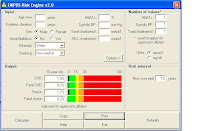My back is playing up and I feel giddy. I suspect that it is because I am trying to wean myself off the Gabapentin and Venlafaxine - the combination of drugs that I use to manage my daily chronic pain. Not the flare ups - I use OxyContin and Diazapam for them, no just the daily pain. I take so many tablets these days for the diabetes and associated, that I am determined to stop rattling like a bag of M&Ms.
Anyway I digress. We are in the process of trying to book next years holiday. You would think it would be simple, but no. Because of my height and my back pain, I cannot fit into a standard economy airplane seat, and I guess I will never be able to fly budget - their seat pitch is about 2" (50mm) less then my back to knee length! So it has to be business class if I am to be able to actually move when we land. Virgin Upper Class Suite is about the best value we have found, and so that is basic requirement number 1. Virgin Upper Class.
We do not want to try and suffer the transfers stuffed like sardines into crammed coaches, same reason as for requirement number 1, so we want private transfers by car. Requirement number 2.
Then we really do not want a hotel overrun with children. We have had our children and really do not want to 'enjoy' other peoples. So requirement number 3, No children and no couples only rule, there will be three of us holidaying..
We want uninterrupted sun. No rain or hurricanes or tornados or typhoons or tropical thunderstorms. Well that rules out the carribean, most of the indian ocean and a lot of asia. Iraq is nice this time of year. So, requirement number 4. No rain.
Yvonne is not particularly fond of anything other than plain food, mostly because anything other than plain food disagrees with her food transit system. So we often go for plain buffet type food plans. Requirement number 5. No spicy food.
With me so far? I mean, these are not unreasonable requests, and we are British after all, and so we helped to shape the world into what it is today (yes, quite), and so it should be a straight forward thing, booking a holiday that meets our needs. Getting back to our needs:
We don't want to stay in the same hotel all the time. In this years holiday we stayed in three, The Burj al Arab, the One and Only Residence & Spa and the Al Maha. All in Dubai, but a multi centre holiday non the less. Shouldn't be difficult next year, we only want to stay in two hotels, the Al Maha in the desert and one other on the coast. The Palm Court & Spa at Jebel Ali looks ok apart from Requirement number 3 which is almost impossible to meet anyway. So requirement number 6 - multi centre holiday but in one resort.
No special medical requirements for travel. I mean, have you ever taken anti malarial tablets? My go, they play absolute havoc with your system, and I've already got diabetes doing that for me, so requirement number 7 - No Mozzies or other nasty lurgy carrying insects.
So, we have seven criteria for our holiday next year and they are easy to meet, because we have already done most of the research.
1. Travel - Virgin Upper Class please.
2. Private Car Transfers please.
3. Al Maha Desert Resort and Spa meets this, Palm Court doesn't, but we can live with that. 10 nights at Palm in Junior Suite HB, 4 nights at Al Maha in Royal Suite FB please.
4. Dubai. June/July . No rain of any type. thank you.
5. Food, the hotels we chose meet this requirement. Thank you.
6. Multi centre / one resort. Can be done, just not on the internet. Need to speak to real people.
7. Dubai meets this need.
So all we want is a tour operator to put the package together and so we googled dubai toour operators and contacted them, clearly explaining our needs. The results back were staggering.
1 in 3 got the basic requirements wrong, even though they were clearly identified. 2 people not 3, wrong room types, wrong Board type, wrong airline etc.
Prices. Lordy what a difference. Let me just tell you that one company wanted a 33% per person deposit (!!!!), and that the most expensive company was twice the price of the cheapest.
Detail. So many got basic things wrong with the holiday details, such as flight numbers and times. (We know that it is VS400 out and VS401 back, and we know the flight times. Pity the tour operators don't!)
So, no, we have not yet booked our holiday, it is almost impossible to make sense of the quotes, so few got it right, how can we trust them? It is no wonder so many people complain about their holidays if the tour operators cannot get it right before their clients go.




